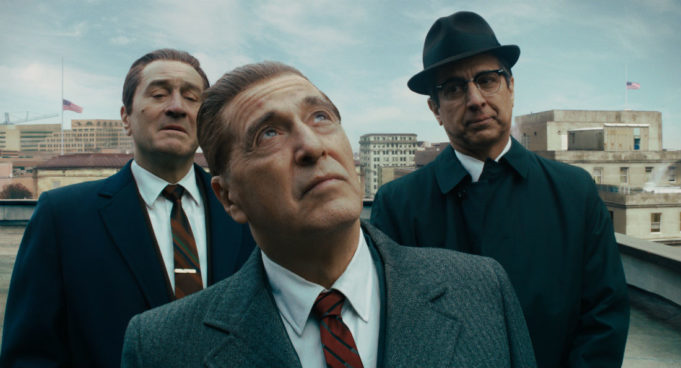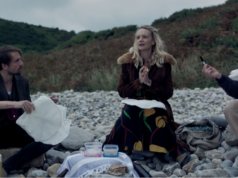In the end, The Irishman’s winless fate at the Oscars was probably down to a surfeit of woe-is-me tales about aging white guys like Joker and Once Upon a Time … in Hollywood. Even so, I would rate Martin Scorsese’s film as the best of those woe-is-me tales, and it’s likely a movie the old master couldn’t have made until he grew old himself.
Two framing devices surround the story, based on Charles Brandt’s dubiously factual book I Heard You Paint Houses. The first one finds Frank “The Irishman” Sheeran (Robert De Niro) an anonymous old man in a nursing home, telling his life story to empty air after having refused to tell it to the FBI or the priest. The second one takes place during a 1975 road trip taken by Frank and his mobster mentor Russell Bufalino (Joe Pesci) from Philadelphia to Detroit, ostensibly for a wedding. From there proceed flashbacks all the way to Frank returning home to Philly from World War II and becoming a driver for the Teamsters. Sicilian mafioso Russell sees promise in Frank and installs him next to the Teamsters’ top man, Jimmy Hoffa (Al Pacino). However, after Hoffa goes free from prison and starts to behave erratically, Frank finds himself torn between his loyalties to the Mafia guys who made him and the larger-than-life union boss.
This mob movie’s great insight is that these gangs are no different than other institutions like governments or corporations, going so far as to rig a presidential election for Kennedy, much to Hoffa’s displeasure. Sure, the mobsters live in grander style than the honest working stiffs around them, but the mob takes away your peace of mind and your time with your family until it eats your soul. Nowhere is this clearer than when Russell orders Frank to participate in Hoffa’s murder, saying, “I had to put you in the middle of it. Otherwise, you would have stopped it.” Too often De Niro has coasted through performances in the last 25 years, but here you see a man shredding at his soul as Frank, having killed his friend, calls Jimmy’s distraught widow (Welker White) and assures her that her missing husband must still be alive somewhere. This film shares a hallmark of Scorsese’s gangster films like Goodfellas, Casino, and The Age of Innocence (which is totally a gangster film) in people who insistently talk around the subject that they’re addressing, partly because they’re afraid of government wiretaps and partly to shield themselves from their business’ grubby realities.
The familiar Scorsesean virtue of good acting from all quarters prevails here. Pesci, who won an Oscar for dominating Goodfellas the way he did, here does fine understated work as a fixer who remains behind the scenes. Ray Romano slots in nicely as a mob lawyer and fellow stand-up comic Sebastian Maniscalco does an effective turn as “Crazy Joe” Gallo, the sort of wantonly violent mobster who draws too much attention to himself. Pacino, who has been guilty of coasting himself through his later years, adds a welcome note of resignation as Hoffa engages in actions he knows will get him killed. He has a great moment, too, when Jimmy learns of Kennedy’s assassination and then calmly goes back to eating his ice cream sundae while everyone else huddles around the TV.
This 209-minute film includes a sidebar that looks unflinchingly at the unromantic reality of growing old behind bars. The film ends unforgettably with an old Frank glimpsed from behind in his room. This is where you end up as a mobster, the movie says: alone, forgotten, estranged from your family, unable to confide in anyone, and all that is if you’re lucky. It is this insight and the way The Irishman builds up to it that makes this one of Scorsese’s masterworks.
Starring Robert De Niro and Al Pacino. Directed by Martin Scorsese. Written by Steven Zaillian, based on Charles Brandt’s book. Rated R..












